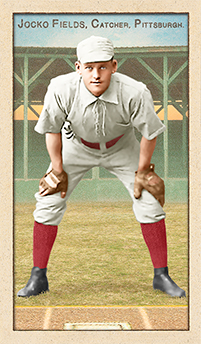
- Series: Beginnings: 1880's
- City: Pittsburgh
- Team: Alleghenys
- League: National League
John Joseph Fields (1864-1950) was named, by Hight Heat Stats, the starting left fielder for the All Emerald Isle Nine. This is, perhaps, less a tribute to Jocko than a commentary on the endeavors of Irish immigrants of the 19th century, who may have had more mundane occupations as they settled into their adopted land. Nevertheless, the list puts Fields in good company with Tommy Bond, Tony Mullane and Jack Doyle among the squad. Jocko was mostly a part-timer in the majors, starting with Pittsburgh's Alleghenys in 1887 where he played two more seasons. The uproar of labor strife in 1890 led to the Players' League founding and Fields tried his luck with the Burghers. Despite being led by Jake Beckley's formidable bat, the rest of the team didn't give much support and they languished in sixth place. Fields did have a decent year, hitting .281, well below his previous season's output when he hit .311. The PL did offer youngsters like Jocko more playing time, however, and he saw more action in '90 than any other campaign. He got into 126 games and drove in 86, nearly half of his six-year career total. He returned to the Pirates in '91 and was shipped to Philadelphia for a handful of games at the end of that season. A final try with the Giants in '92 lasted only 21 games and proved his swan song. Jocko's pro career had begun with the Jersey City Skeeters in 1885 followed by three NY teams in '86 before the Alleghenys called. He stayed in the game through the 1896 season for such teams as the Macon Hornets, Charleston Seagulls and Evansville Black Birds. He split his final tour between the Atlanta Crackers and Norfolk Braves. If nothing else, baseball provided a way for a young immigrant lad to really see the country.
- Fields' last few years in the minors saw him hit as well as he ever had. He averaged .351 for Charleston, and a combined .326 for those last two clubs in '96
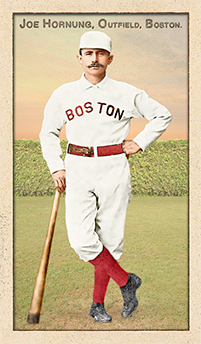
- Series: Beginnings: 1880's
- City: Boston
- Team: Beaneaters
- League: National League
Michael Joseph Hornung (1857-1931) made a lasting impression in the baseball world of his day on at least two grounds. Most noteworthy, he was perhaps the premier defensive outfielder of the 1880s. His sure-handedness allowed him to lead the National League in fielding percentage in 1881, ‘82, ‘83 and ‘86. The second basis of notoriety for Hornung was what must have been a very annoying habit. He would shout “ubbo, ubbo!” whenever he got a hit or made a play he fancied. Since he hit a respectable .257 over his twelve-year career, and made just about all the plays that came his way in the no-glove era, the ballparks of the day must have resounded with many an “ubbo.” His antics led to his nickname Ubbo Ubbo, which meant others beside himself were uttering the gibberish all too frequently.
Joe had begun his pro career in Canada with the London (Ontario) Tecumsehs in 1876. His major league debut was with the Buffalo Bisons in 1879 and in '81 made the move to Boston which would be his home through the 1888 season. The colorful star's performance declined and the Beaneaters tried to sell him to the White Stockings. The veteran balked, insisting on a piece of the $5000 price, and was rewarded by being ousted from the league. The American Association's Orioles welcomed Joe and he played one year on a bad leg before ending his big league career in 1890 with the Giants. His speed had been an asset afield and on the bases. Hornung was a renowned base-stealer, usually among the leaders in triples, and led the NL in scoring in 1883.
- Ubbo Ubbo's popularity was such that the vaunted '27 Yankees honored him on his June 12 birthday at the stadium. Ruth, Gehrig, Lazzeri and all serenaded Joe and he received a “nice check” from players who remembered him fondly as one of the greats.
- His hometown Utica paper hailed him as “King of the Left Fielders” and “just as much a baseball hero as Ty Cobb, Babe Ruth or Tris Speaker is today.”
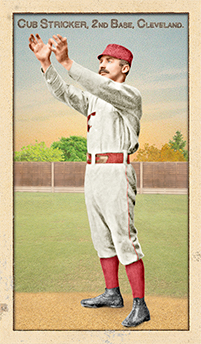
- Series: Beginnings: 1880's
- City: Cleveland
- Team: Spiders
- League: National League
John A. Stricker (nee Streaker) (1859-1937) played second base over an eleven year career in the majors. The native Philadelphian broke in with his hometown Athletics in 1882 and stayed for four seasons. He never caught fire in Philly, batting a meager .239 during his tenure there. The Athletics consigned Cub to the Southern Association’s Atlanta squad before the 1886 season. The following year Stricker was dealt to Cleveland. During his time on the shores of Lake Erie, Stricker saw the team morph from the American Association’s Blues to the NL’s Spiders and, in the 1890 uprising of the Players’ League, Cub became an Infant. He boosted his average a bit and was much more productive on offense overall. He emerged as a fairly adept base-stealer, swiping 86 in his first year with the Blues, his best on the basepaths for his career. Having never been a regular with the Athletics, Stricker was an everyday player throughout his time in Ohio and continued that pattern in 1891 when he moved to Boston with the AA’s Reds. Thereafter, Cub’s performance and plate appearances dwindled rapidly and he bounced from club to club for the remainder of his big league experience. Two episodes late in his career give evidence of a fiery temperament that made Stricker a durable competitor and even gave him a shot at managing while sometimes exposing a darker side. On at least two occasions Cub couldn’t resist the baiting of rowdy fans. His tour as manager of the Browns ended when, after a losing streak, Stricker leaped into the stands to punch a heckler. With the Senators in ‘93, in a game back home in Philadelphia, he couldn’t abide the fans’ jeers. He claimed later that the ball he loosed into the stands was meant to hit only the low fence. Unfortunately, it bounced into the stands and broke the nose of a paying customer, leading to Stricker’s arrest.
- Out of the majors following his contretemps, Cub played minor league ball for several more years, primarily in Providence for the Clamdiggers/Grays into 1896. He had a final go of it with Chester of the Pennsylvania State League in 1901 at the ripe age of 42
- Stricker received the nickname Cub due to his diminutive stature
- Stricker enjoys four known poses in the Old Judge canon, but is credited with six different cards as two cards are known in two different cropped-image variations each.
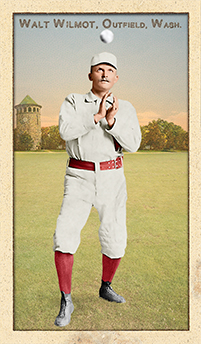
- Series: Beginnings: 1880's
- City: Washington, D.C.
- Team: Nationals
- League: National League
Walter Robert Wilmot (1865-1929) was a switch-hitting outfielder who played for three teams over a ten-season major league career. The high-point of his tenure came in 1894, a wondrous year for hitters in general. The second season after the mound moved to 60' 6'' saw output the likes of which have not been seen before or since. Wilmot far exceeded his normal average, hits and RBI and scored 136 runs - a total that would have placed him in the NL's top-ten any other year of the decade and beyond. But the likes of Hugh Duffy, Billy Hamilton, Joe Kelley and Wee Willie Keeler were setting baseball's world on fire.
That year Hamilton's Phillies fielded the strongest-hitting outfield of all-time, averaging over .400 with sub Tuck Turner exceeding even Billy, Ed Delahanty and Sam Thompson. So where did the mighty slugging Phil's wind up? In fourth place trailing the legendary Orioles by 18 games. But it was in runs-scored that '94 stood out. In most years of the era, one or two teams might barely plate a thousand runners. But in 1894 five teams blew past that mark and four others nearly hit it. Overall, the National League squads averaged an all-time high 7.36 runs per game.
All of this left Wilmot with an outstanding also-ran year for the ages, batting .330 with 197 hits, 134 runs and 130 RBI in just 133 games. Walt broke in with Washington in 1888, spent the first half of the nineties in Chicago and wrapped up with the Giants in 1897-98. He led the NL in triples in '89 and the following campaign tied for the HR lead.
- Wilmot was the first batter to walk six times in a game (8.22.1891)
- He played beside Dummy Hoy in D.C.'s outfield
- In addition to his decade in the majors, Walt played eight minor league seasons beginning with St. Paul in 1886 and ending in Butte, MT of the Pacific National League in 1904
- His MLB stats include a .276 average with 92 triples
- Wilmot’s uniform color on this card was changed in July, 2017 from blue to red to reflect recent reliable research by Craig Brown & friends at Threads of Our Game. One card was previously released featuring a blue uniform.
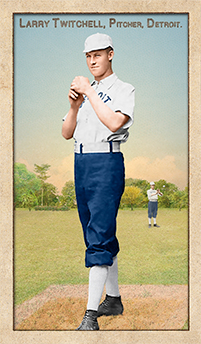
- Series: Beginnings: 1880's
- City: Detroit
- Team: Wolverines
- League: National League
Lawrence Grant Twitchell (1864-1930) spent the afternoon of August 15, 1889 having himself a grand day out. The box score would read: six for six, plus a walk; a homer, three triples, a double and a single; five runs scored; and 16 total bases. Had he not led off three innings he might have had more than his three RBI. Oh, and the outfielder even relieved in the second inning. The Cleveland Leader said of their home team's effort: “Twenty-seven hits for a total of forty-eight bases doesn't grow on every tree and never grew in Cleveland before, that's for sure.” Remarkably, it took a mere five years for Larry's total-bases mark to be eclipsed by Bobby Lowe of the Beaneaters. That mid-summer feat was the highlight, but far from the whole story of Twitchell's career. He was a strong fielder and is purported to have thrown a ball 407' - the longest throw on record in the 19th century. He played for seven MLB clubs over his nine-year career. Prior to returning to his hometown Spiders, Larry had starred for the Wolverines, his first team, from 1886-88 including the '87 “world series” title versus the Browns. That championship season saw Twitchell hit .333 while taking the “mound” in 15 games (twelve as a starter) and going 11-1. Ironically, Twitchell's teammate in Detroit, the renowned slugger Dan Brouthers, had set the NL record for total bases in 1886 with 15. After leaving the Spiders for Cleveland's Players' League entry in 1890, Larry migrated to other teams and lesser performance. It must have been satisfying when he was invited to a Cleveland Old Timer's game in 1921, playing alongside fellow sandlot veterans Cy Young, Chief Zimmer, Nap Lajoie and Elmer Flick.
- Twitchell's only blemish as a pitcher in '87 came in a 14-inning one-hitter loss
- His five extra-base hit day wasn't equalled until Josh Hamilton did it in 2012. In 2015, Jackie Bradley, Jr. also tied that mark
- Inducted into Cleveland Sports Hall of Fame: 1980




